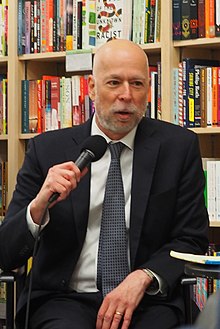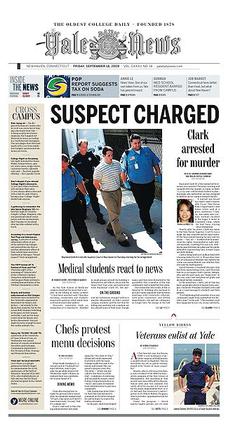
The Yale Daily News is an independent student newspaper published by Yale University students in New Haven, Connecticut since January 28, 1878. It is the oldest college daily newspaper in the United States.

Joseph Anthony Lewis was an American public intellectual and journalist. He was a two-time winner of the Pulitzer Prize and was a columnist for The New York Times. He is credited with creating the field of legal journalism in the United States.
Georgetown Day School (GDS) is an independent coeducational PK-12 school located in Washington, D.C. The school educates 1,075 elementary, middle, and high school students in northwestern Washington, D.C. Russell Shaw is the current Head of School.
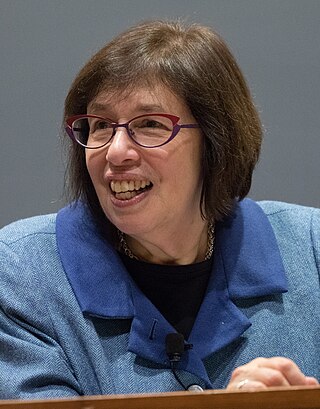
Linda Joyce Greenhouse is an American legal journalist who is the Knight Distinguished Journalist in Residence and Joseph M. Goldstein Lecturer in Law at Yale Law School. She is a Pulitzer Prize-winning reporter who has covered the United States Supreme Court for nearly three decades for The New York Times. Since 2017, she is the president of the American Philosophical Society, and a member of the Phi Beta Kappa Senate.
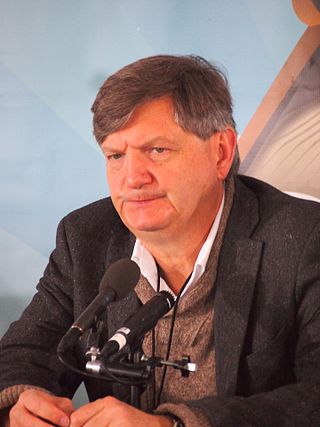
James Risen is an American journalist for The Intercept. He previously worked for The New York Times and before that for Los Angeles Times. He has written or co-written many articles concerning U.S. government activities and is the author or co-author of two books about the Central Intelligence Agency (CIA) and a book about the American public debate about abortion. Risen is a Pulitzer Prize winner.

James C. Goodale was the vice president and general counsel for The New York Times and, later, the Times' vice chairman.

William Cameron Canby Jr. is a senior United States circuit judge of the United States Court of Appeals for the Ninth Circuit, sitting in Phoenix, Arizona.

Adam Haslett is an American fiction writer and journalist. His debut short story collection, You Are Not a Stranger Here, and his second novel, Imagine Me Gone, were both finalists for both the Pulitzer Prize and the National Book Award. He has been awarded fellowships from the Guggenheim Foundation, the American Academy of Arts and Letters, and the American Academy in Berlin. In 2017, he won the Los Angeles Times Book Prize.

Richard Randall Clifton is a senior United States circuit judge of the United States Court of Appeals for the Ninth Circuit.

Harry Scott Ashmore was an American journalist who won a Pulitzer Prize for his editorials in 1957 on the school integration conflict in Little Rock, Arkansas.
Charles Alan Reich was an American academic and writer best known for writing the 1970 book, The Greening of America, a paean to the counterculture of the 1960s. Excerpts of the book first appeared in The New Yorker, and its seismic reception there contributed to the book leading The New York Times Best Seller list. Due to the theme and implications of this book Reich was described as a "high priest of antitechnology".
The Harvard Law Record is an independent student-edited newspaper based at Harvard Law School. Founded in 1946, it is the oldest law school newspaper in the United States.

Adam Seth Cohen is an American journalist, author, lawyer, and former assistant editorial page editor of The New York Times. He also worked in the administration of New York City Mayor Bill de Blasio.

Pamela Susan Karlan is an American legal scholar who was the principal deputy assistant attorney general in the Civil Rights Division of the United States Department of Justice from February 8, 2021 until July 1, 2022. She is a professor at Stanford Law School. A leading legal scholar on voting rights and constitutional law, she previously served as U.S. Deputy Assistant Attorney General for Voting Rights in the DOJ's Civil Rights Division from 2014 to 2015.
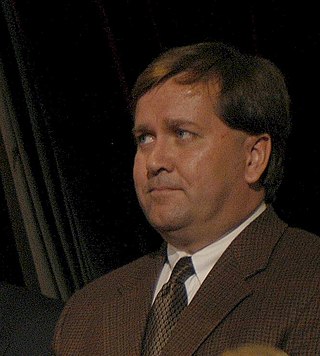
David Barstow is an American journalist and professor. While a reporter at The New York Times from 1999 to 2019, Barstow was awarded, individually or jointly, four Pulitzer Prizes, becoming the first reporter in the history of the Pulitzers to be awarded this many. In 2019, Barstow joined the faculty of the UC Berkeley Graduate School of Journalism as a professor of investigative journalism.
Daniel Epps is a professor of law at Washington University in St. Louis. Epps teaches first-year criminal law, constitutional law, upper-level courses in criminal procedure, and a seminar on public law theory. His scholarship has appeared in the Harvard Law Review, the Yale Law Journal, the Michigan Law Review, and the NYU Law Review, and his writing for popular audiences has appeared in the New York Times, the Washington Post, Vox, and The Atlantic. His and Ganesh Sitaraman's proposal to expand the size of the Supreme Court was endorsed by Mayor Pete Buttigieg during his run for the 2020 Democratic Presidential nomination. His and William Ortman's proposal to create a "Defender General" for criminal defendants at the Supreme Court was the subject of an article in the New York Times.
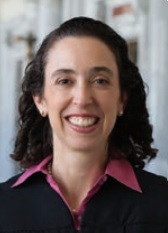
Michelle Taryn Friedland is a United States circuit judge of the United States Court of Appeals for the Ninth Circuit.
Stephen Yale-Loehr, is an American law professor and immigration law attorney. Yale-Loehr earned his undergraduate and law degrees from Cornell University in 1977 and 1981, respectively. He was editor-in-chief of the Cornell International Law Journal during his time at the law school. Upon graduating he clerked for Judge Howard G. Munson of the U.S. District Court, Northern District of New York, nominated by President Gerald Ford. Yale-Loehr has been a member of the Cornell Law faculty since 1991.

Andrew Maraniss is an American author, best known for his book, "Strong Inside: Perry Wallace and the collision of race and sports in the south", depicting Perry Wallace, the first African-American to play college basketball under an athletic scholarship in the Southeastern Conference in the 1960s. The book was on the New York Times best-seller list in both the sports and civil rights categories for four consecutive months. It received the 2015 Lillian Smith Book Award and a Special Recognition Award by the Robert F. Kennedy Book Awards Foundation.
